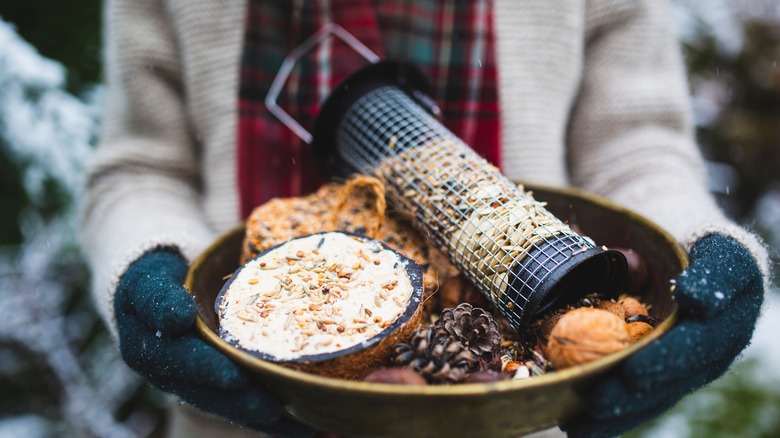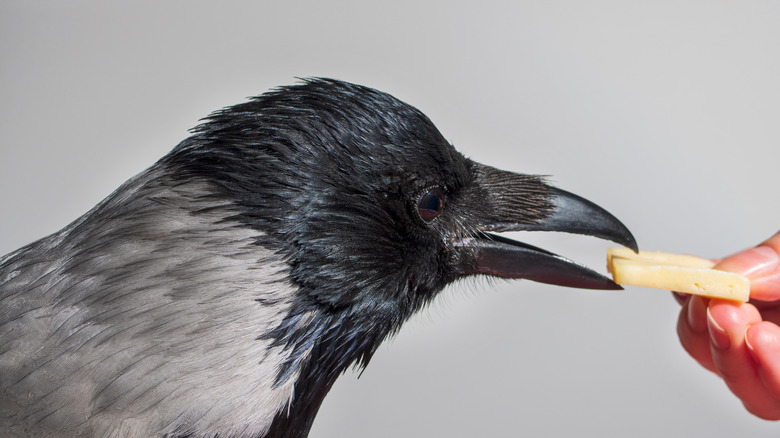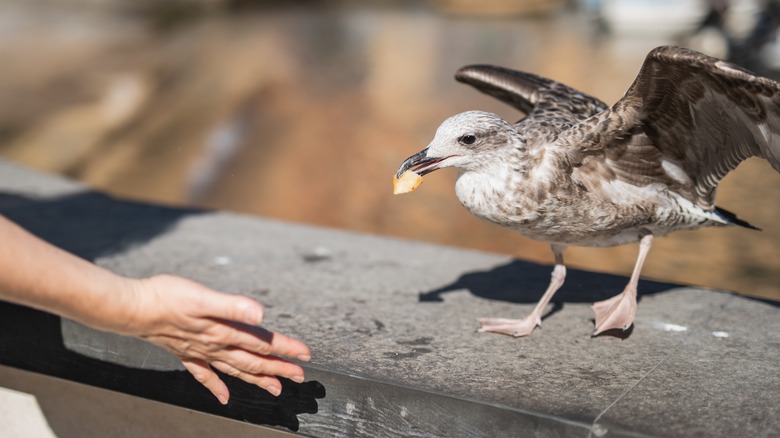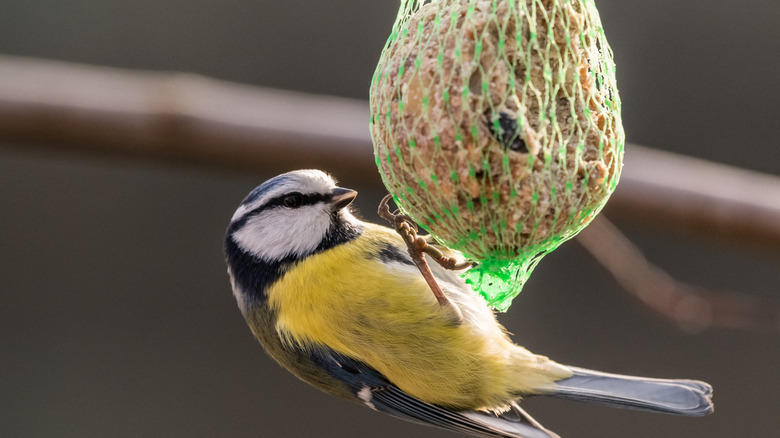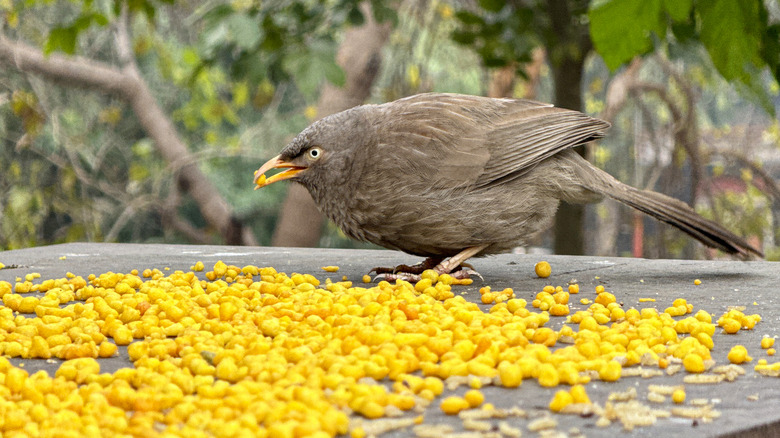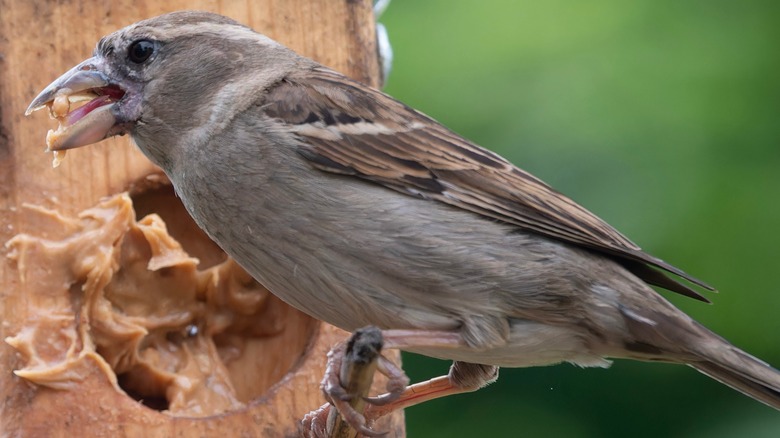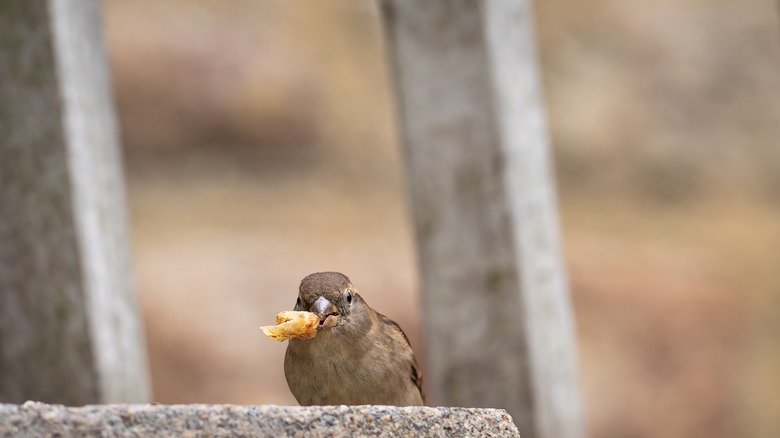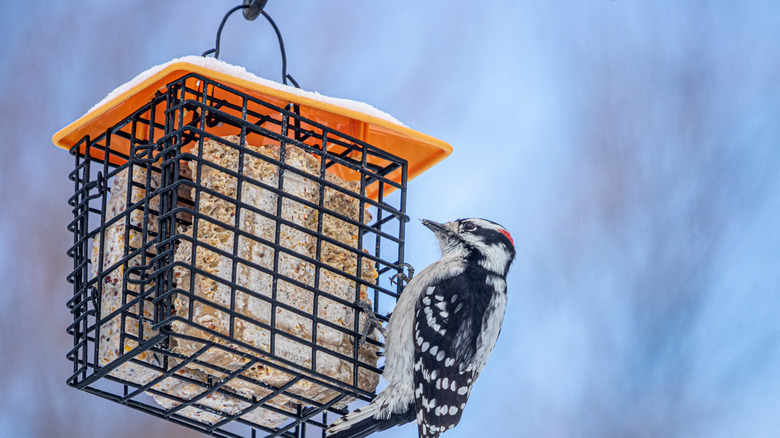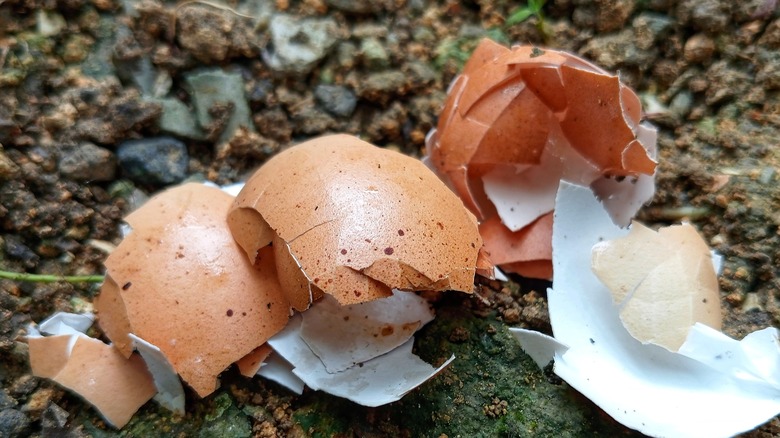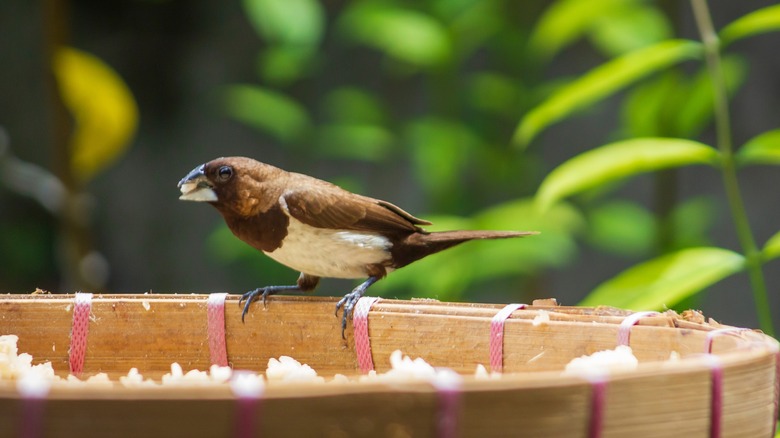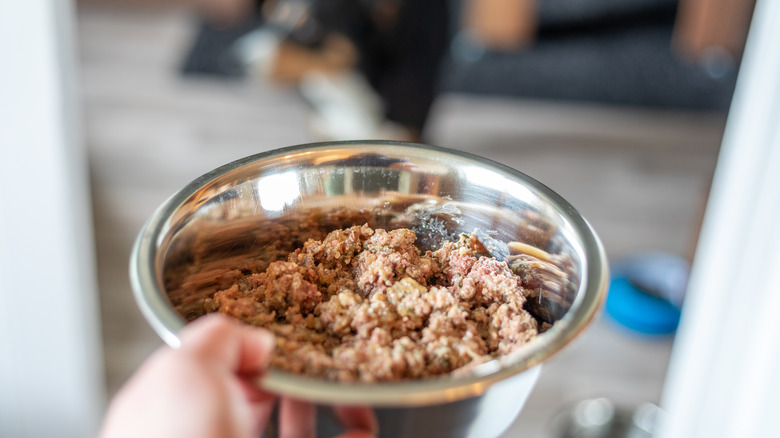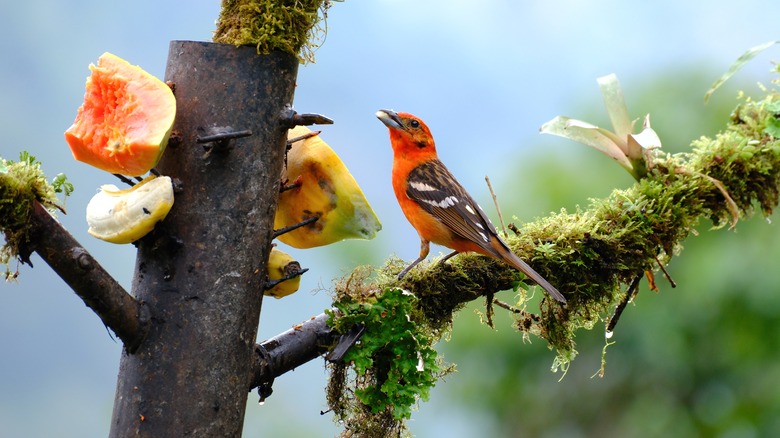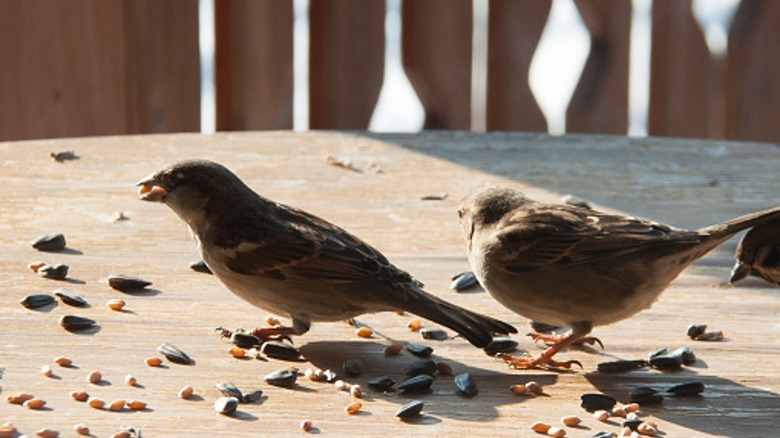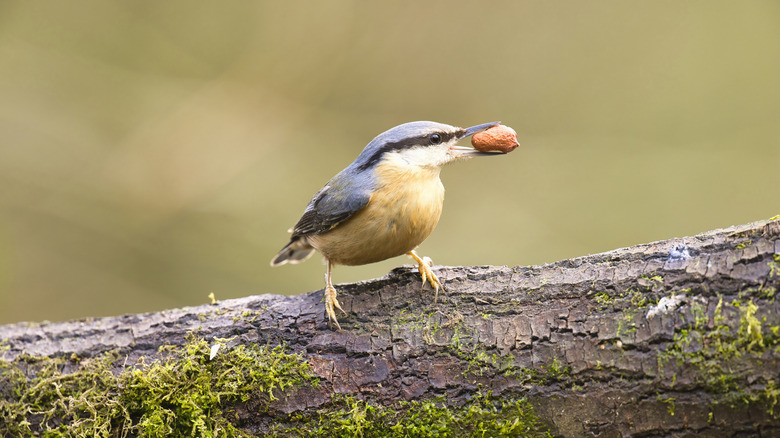Use These 13 Leftover Kitchen Scraps To Safely Attract Birds To Your Yard
One of the best ways to attract birds to your garden or yard is to offer them some of their favorite foods. While you can always opt for bird seed, suet, and other store-bought meals, there are other things that may already be in your home that make great additions to your feeders, including leftover table scraps and expired pantry items, many of which are perfect to give to your feathered friends. While not all human foods are good for birds, many are, including all-natural elements like grains, seeds, nuts, and protein sources that give birds a hearty meal.
Many of these ingredients can be put out in your feeders as a supplement to other kinds of birdseed or nectars or by themselves. Some require cooking, grinding, or dicing to be the ideal safe size for bird consumption. While using leftovers and scraps is a great way to draw some birds with a preference for these foods, make sure they are in good condition, without mold or spoilage that may be toxic to wildlife.
Hard cheeses
While many birds have a low tolerance for lactose, certain low-lactose cheeses are okay for birds to eat, including some types of cheddar, Monterey Jack, Colby Jack, Swiss, Parmesan, and Gouda. Shred or crumble some cheese over other bird food components like seed to help make birds flock to your yard. The fat concentration is especially crucial to provide in the winter, when it adds necessary nutrients to the birds' diet, which can mean extra energy when birds need it most. However, high-lactose cheeses, like Brie, blue cheese, and mozzarella, should be avoided, as should cheeses with added flavors or elements.
Crackers
While leftover and stale bread has often been a popular choice for throwing out into your yard for birds, many experts, like the Humane Society, discourage feeding birds leftover bread since the higher volume food contains fewer nutrients for them than other foods they may encounter. If you do want to feed the birds bread, higher wheat and multigrain breads are a much better option, as are crackers that contain many of the same seeds that you find in bird seed mixes, like poppy and sesame. Stale cereal and oats without additives are also great for birds.
Pastry dough
While baked goods like cookies, cakes, and pies are a poor choice for feeding the birds in your yard due to the added sugar and preservatives often present, uncooked pastry dough, like filo dough, can be broken up and fed to birds — provided it is not high in sugar or sodium. You can even use kitchen ingredients in a similar recipe for pastry dough to make a suet dough specifically designed for your feathered friends using animal fats like lard or nature-drawn ones like peanut butter. Just make sure to cut it up into small enough chunks for the birds to enjoy, or form a DIY suet block.
Peas and corn
While birds are not able to digest all vegetables, particularly when they are offered raw, cooked peas make an excellent, safe addition to your bird feeder. It's a great opportunity to cook up freshly expired pantry cans or frostbitten bags of peas. Corn, in general, is another option that is often already included in many seed mix varieties, but you can also serve birds sweet corn both on and off the cob. These smaller veggies are great for mixing in with your regular seed blend since their color and texture may make birds extra-attracted to your feeder when they're in the mix.
Peanut butter
This spread is as popular among birds as it is among humans, with many species like blue jays, nuthatches, and woodpeckers being especially drawn to the treat. Avoid peanut butters with lots of added sugar and salt, however, and stick to more natural-based spreads — though keep in mind these may be messier to work with. Use it as an addition to your suet, or spread some peanut butter on a pine cone or tree bark to attract birds to your yard. Since it's rich in fats, this is a great wintertime treat for birds.
Potatoes
Potatoes are another starchy vegetable that is great for birds, including leftover mashed potatoes and small chunks of cooked potato without added salt, butter, or other flavors or seasonings. Make sure to remove the skins, however, since raw potatoes and skins contain a chemical called solanine, which can be a toxin for birds in large enough amounts. Adding mashed potatoes to your feeder after the holidays is a great way to get rid of leftovers and give the birds something good to eat during the cold winter months when carbohydrates provide important energy. While some birds, like pigeons and seagulls, seem especially fond of french fries, the additional salt and preservatives are best avoided.
Meat fats
Cooked animal fats are a great source of proteins and fats for birds, provided they are as close to their natural state as possible — this means no additional sodium or seasoning added. This is also a chance to get rid of unused rinds and skin from pork and beef. Bacon, however, as well as bacon fat, should usually be avoided, since the curing process involves added salt and chemical preservatives not ideal for feathered friends. Also, keep in mind that leaving out meat products can lure other kinds of pests like rodents and insects, so it is not advised unless you know it will disappear swiftly.
Eggs and eggshells
Cooked eggs are another great source of protein for birds. This is a good opportunity to dispose of scrambled or hardboiled eggs that you are not going to use. Sprinkle them over seed or add bits to a suet mix. Eggs shells are also great for birds and provide additional calcium and other nutrients. Just dry them out before adding them to your feeders for a few days, or heat them in a low oven to dry them faster. Since cooked eggs can draw rodents or pests, just make sure not to leave them out overnight.
Cooked pasta or rice
While raw pasta can be too hard for many birds to eat, you can offer the birds in your yard cooked pasta as a great carb-laden treat. This works great for small pastas like macaroni and orzo, as well as larger pastas that you will need to cut up into smaller chunks. Just make sure the pasta does not have a sauce or other additives that can make it too salty. Rice can also be perfect for birds and is especially loved by finches, sparrows, and pigeons.
Dog food
Extra dog food can be a great addition to your feeder, though you will want to monitor your feeders and clean them regularly to avoid pests. Add wet dog food to a seed mix. Or use dry food that is ground or broken down into bite-size pieces that are ideal for birds. The best dog foods to use are those that are lower in added sodium and closer to all-natural ingredients. While it's great as a treat, it should not be relied on too much since it lacks many of the nutrients birds need.
Fruit
Fruits of all sizes are often popular among birds in the natural world, which means they are a great addition to feeding areas. This is an excellent chance to get rid of damaged and bruised fruit or to dispose of fruit that has gotten too ripe. The best approach is to cut fruits into small bite-size pieces and add them to feeders. Hang oranges and other citrus fruits from a tree to make hummingbirds flock to your yard with their sweet aroma and bright color. Over-ripe bananas are also a great secret to attracting hummingbirds to your yard.
Grains or lentils
One of the best things to add to your bird feeders is grains and lentils, which are especially great for attracting sparrows, buntings, and finches. Add them to your feeders cooked or raw, whole or ground. Feeding them to the wildlife is a great way to get rid of bags that have been sitting too long in the pantry, or a perfect way to dispose of leftovers. Just make sure they do not have added salt, sugar, or seasoning. Raw beans, however, can contain a chemical called hemagglutinin, so make sure you cook any beans before offering them to the birds.
Unsalted nuts
Unsalted nuts are often an easy way to add additional protein to the bird seed in your yard. Just make sure the nuts do not have added sodium or other seasoning that may not be good for birds. Great options include shelled peanuts, walnuts, hazelnuts, pecans, acorns, and almonds. Nuts are especially tasty to magpies, woodpeckers, and jays. Large fragments or whole nuts are also perfect for larger birds like ducks and turkeys. If adding nuts to your feed, make sure to keep them in a dry place since moisture can cause nuts to mold.
